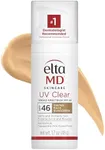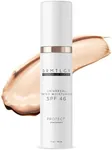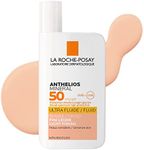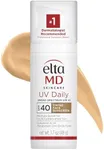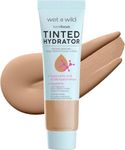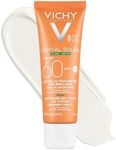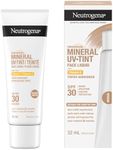Buying Guide for the Best Tinted Sunscreens
Choosing the right tinted sunscreen is about finding a product that not only protects your skin from the sun but also matches your skin tone and fits your daily routine. Tinted sunscreens combine sun protection with a hint of color, helping to even out your complexion while shielding you from harmful UV rays. When shopping for one, it's important to consider how it feels on your skin, how well it blends, and whether it meets your specific needs, such as coverage, finish, and skin type compatibility.SPF RatingSPF stands for Sun Protection Factor, and it measures how well the sunscreen protects your skin from UVB rays, which are the main cause of sunburn. The higher the SPF number, the greater the level of protection. SPF values are usually divided into low (15-30), medium (30-50), and high (50+). If you spend a lot of time outdoors or have fair skin, a higher SPF is generally better. For everyday indoor use or short outdoor exposure, a lower SPF may be sufficient. Your choice should depend on your daily sun exposure and your skin's sensitivity to sunlight.
Tint Shade RangeTinted sunscreens come in various shades to match different skin tones, from light to deep. The right shade helps the sunscreen blend seamlessly into your skin, avoiding a chalky or unnatural look. Some products offer only a few shades, while others have a broader range. If you have trouble finding a perfect match, look for brands that offer more options or products labeled as 'sheer' or 'universal tint,' which are designed to adapt to a wider range of skin tones. Your goal is to pick a shade that closely matches your natural skin color for the most natural appearance.
Finish (Matte, Dewy, Natural)The finish of a tinted sunscreen refers to how it looks and feels on your skin after application. Matte finishes help control shine and are good for oily or combination skin, while dewy finishes give a glowing, hydrated look, which is ideal for dry or dull skin. A natural finish sits somewhere in between, offering a balanced look suitable for most skin types. Consider your skin type and personal preference when choosing the finish, as this will affect how comfortable and confident you feel wearing the product.
Coverage LevelCoverage describes how much the tinted sunscreen can even out your skin tone and hide imperfections. Light coverage gives a subtle, barely-there look, medium coverage helps to cover minor blemishes and redness, and full coverage can hide more noticeable imperfections. If you prefer a natural look or don't need much correction, light coverage is best. For those who want more help with uneven skin tone or blemishes, medium or full coverage may be more suitable. Think about your daily makeup routine and how much coverage you usually like.
Skin Type CompatibilityDifferent tinted sunscreens are formulated for different skin types, such as oily, dry, sensitive, or acne-prone skin. Some are oil-free and non-comedogenic, making them suitable for oily or acne-prone skin, while others contain hydrating ingredients for dry skin. If you have sensitive skin, look for products labeled as hypoallergenic or fragrance-free. Knowing your skin type will help you choose a product that feels comfortable and doesn't cause irritation or breakouts.
Active Ingredients (Mineral vs. Chemical)Tinted sunscreens use either mineral (physical) or chemical filters to protect your skin from the sun. Mineral sunscreens use ingredients like zinc oxide or titanium dioxide, which sit on top of the skin and reflect UV rays. Chemical sunscreens absorb UV rays and convert them into heat. Mineral options are often recommended for sensitive skin, while chemical sunscreens tend to be lighter and less visible on the skin. Your choice depends on your skin's sensitivity and your preference for how the product feels and looks.
Water ResistanceWater resistance indicates how well the tinted sunscreen stays on your skin when exposed to water or sweat. Some products are labeled as water-resistant for 40 or 80 minutes, meaning they maintain their SPF protection for that amount of time while swimming or sweating. If you plan to be active outdoors or in water, choose a water-resistant formula. For everyday use where you won't be sweating much or getting wet, this feature may be less important.
